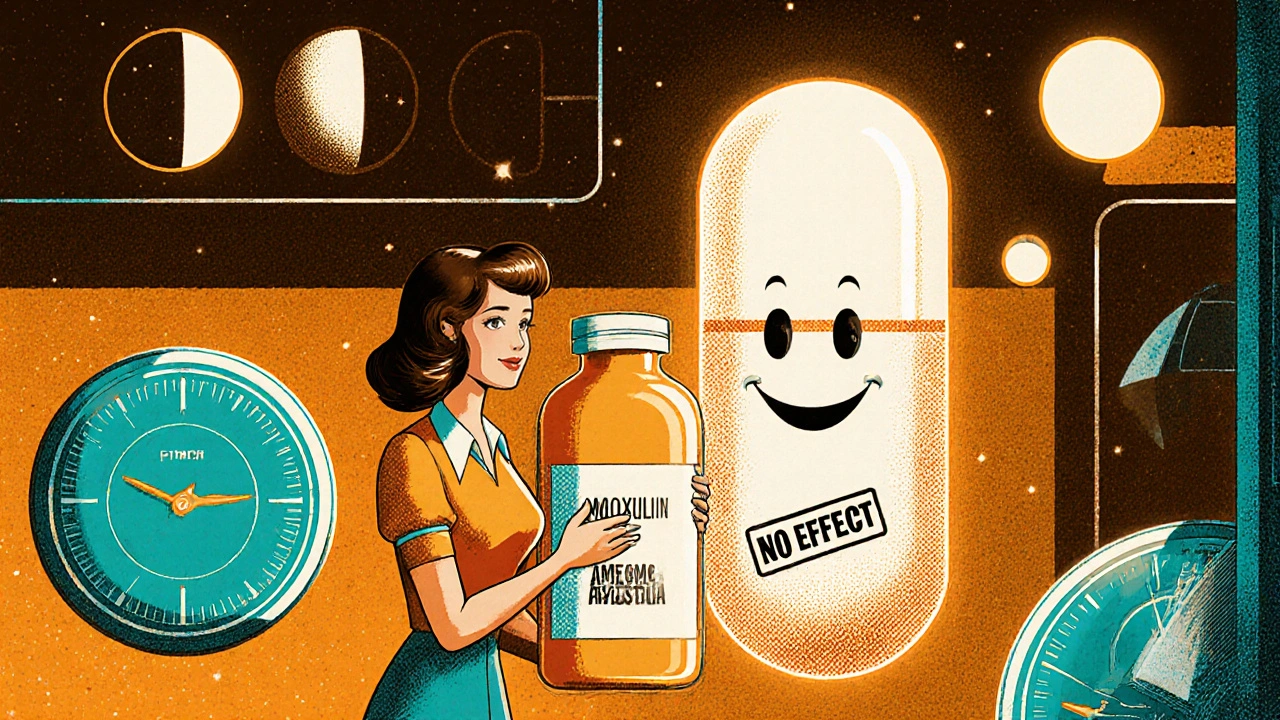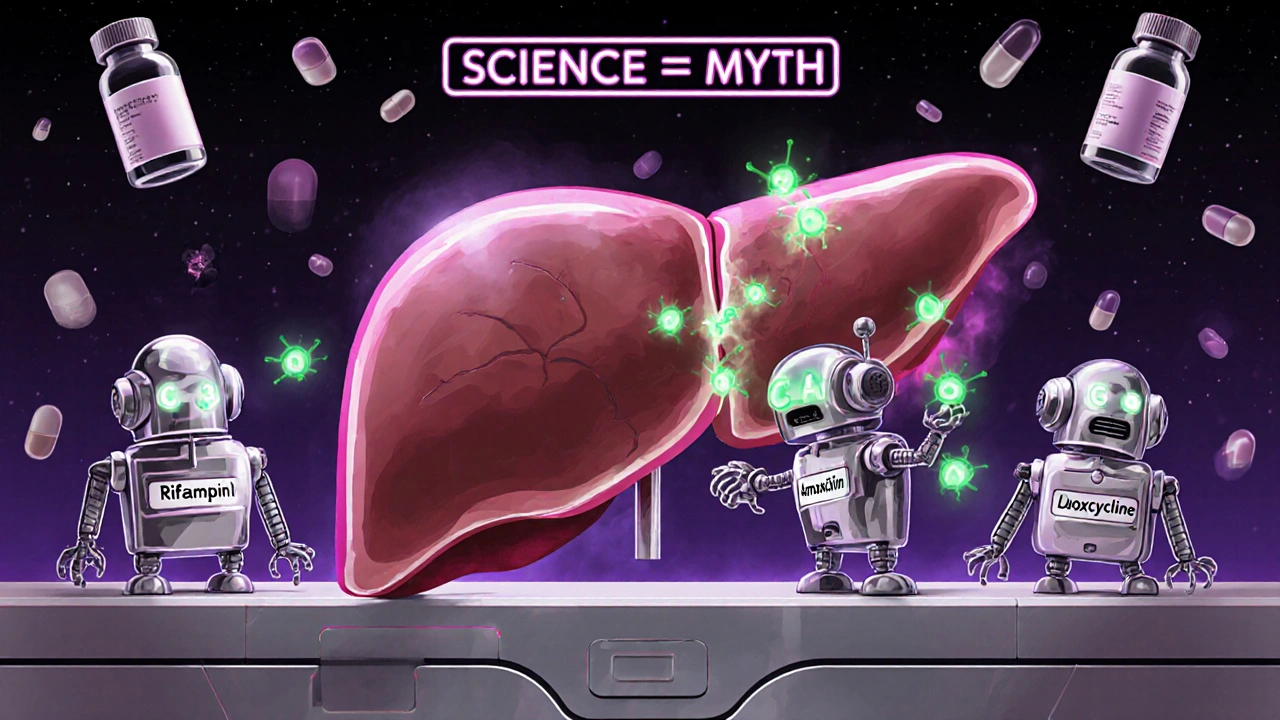Antibiotic Interactions with Birth Control Pills: What’s Actually Proven
 Nov, 16 2025
Nov, 16 2025
Birth Control & Antibiotic Interaction Checker
This tool is based on current medical evidence showing that only two antibiotics (rifampin and rifabutin) significantly reduce birth control effectiveness. Most common antibiotics like amoxicillin or doxycycline do not interfere.
What this tool shows:
Based on evidence from major medical organizations like ACOG, CDC, and the European Medicines Agency, this tool will tell you whether your antibiotic may reduce birth control effectiveness.
No interaction detected
Your antibiotic does not reduce birth control effectiveness. This is based on multiple large studies showing no meaningful change in hormone levels or pregnancy rates when taking common antibiotics with birth control pills.
Recommendation: Continue taking your birth control as prescribed. No additional protection needed.
For decades, women have been told: antibiotics can make your birth control fail. If you’ve ever been handed a prescription for amoxicillin or doxycycline and then told to use a condom, you’re not alone. But here’s the truth: for almost all antibiotics, that warning is outdated, unnecessary, and not backed by science.
Only One Antibiotic Has Proven Effects
The only antibiotic with solid, repeated evidence of reducing the effectiveness of birth control pills is rifampin (also called rifampicin). This drug is used to treat tuberculosis and some other serious infections. It works by speeding up how your liver breaks down hormones - including the estrogen in birth control pills. Studies show it can drop estrogen levels by 40% to 60%. That’s enough to increase pregnancy risk.There’s also rifabutin, a similar drug sometimes used for infections like MAC in people with HIV. It has a weaker effect, cutting estrogen levels by about 25%. Doctors usually recommend extra precautions with this one too.
Every other antibiotic - including amoxicillin, doxycycline, azithromycin, ciprofloxacin, metronidazole, and penicillin - has been studied extensively. Multiple large reviews, including a 2018 analysis of 1,852 women published in the American Journal of Obstetrics & Gynecology, found no increase in pregnancy rates when these antibiotics were taken with birth control pills. The pregnancy rate was nearly identical: 0.69 per 100 woman-years with antibiotics versus 0.54 without. That difference? Statistically meaningless.
Why the Confusion Exists
If the science is clear, why do so many people still believe antibiotics ruin birth control? The answer lies in history and fear.In the 1970s, when birth control pills had much higher doses of estrogen (50-100 mcg), there were a few scattered reports of women getting pregnant while on antibiotics. Back then, the pills were stronger, and the body’s hormone balance was more sensitive. Those early case reports stuck. They became standard advice, passed down from doctor to pharmacist to patient.
Today’s pills contain only 20-35 mcg of estrogen - less than half. That lower dose makes them less vulnerable to minor changes in metabolism. Modern studies, including ones published in Clinical Pharmacology & Therapeutics and the British Journal of Clinical Pharmacology, show no meaningful drop in hormone levels with common antibiotics like amoxicillin or doxycycline.
Yet the myth lives on. A 2017 survey found 68% of community pharmacists in the U.S. still tell patients to use backup contraception with amoxicillin. That’s despite zero evidence supporting it. Meanwhile, 98% of pharmacists correctly warn about rifampin. That gap between science and practice is huge - and it’s costing women time, money, and peace of mind.
How Antibiotics Might (Theoretically) Interfere
You’ve probably heard two explanations: “Antibiotics kill good gut bacteria, which affects hormone recycling,” or “They change how your liver processes hormones.”The gut theory sounds plausible. Estrogen is reabsorbed in the intestines after being processed by the liver. Some believe antibiotics disrupt the bacteria that help with this recycling. But research doesn’t support it. Even when antibiotics like amoxicillin wipe out gut flora, studies show no drop in hormone levels. The body has backup pathways - and the amount of estrogen recycled this way is tiny.
The liver enzyme theory is real - but only for rifampin. It strongly activates CYP3A4, an enzyme that breaks down estrogen. Other antibiotics don’t do this. Even macrolides like erythromycin and azithromycin, which were once suspected, have been shown in controlled trials to have no effect on birth control hormone levels.
One rare exception was dirithromycin - a macrolide no longer sold in the U.S. or U.K. It showed a slight increase in estrogen clearance, but even that didn’t lead to actual pregnancy in real-world use.

What the Experts Say Now
Major medical groups have updated their guidance based on decades of evidence:- ACOG (American College of Obstetricians and Gynecologists): “Only rifampin has been shown to decrease effectiveness.”
- UK Faculty of Sexual and Reproductive Healthcare: “There is no evidence for an interaction between combined hormonal contraception and broad-spectrum antibiotics (excluding rifampicin and rifabutin).”
- Centers for Disease Control and Prevention (CDC): Rifampin is Category 4 (not safe). All other antibiotics are Category 1 (no restrictions).
- European Medicines Agency: After a 2022 review, EU-approved birth control labels no longer list non-rifamycin antibiotics as interactions.
Even the FDA is moving. In 2022, draft guidance said drug labels should only warn about interactions backed by “specific evidence of clinical significance.” That means the vague warnings on birth control packaging - which say “antibiotics may reduce effectiveness” - are due for an update. A 2020 petition from the American Society for Reproductive Medicine asked the FDA to remove those misleading lines. Progress is slow, but it’s coming.
Real-World Impact: Money, Stress, and Misinformation
This isn’t just about science. It’s about money and mental health.In the U.S., about 10.6 million women use birth control pills. A 2021 estimate found that nearly $147 million a year is spent on emergency contraception because women fear antibiotics ruined their pill. That’s $147 million on pills they didn’t need.
On Reddit, a 2020 analysis of over 1,200 threads showed 78% of users were anxious about this issue. 43% said their pharmacist told them to use condoms - even for amoxicillin. On Drugs.com, 89 out of 147 reports of “birth control failure” involved amoxicillin. None involved rifampin.
That fear leads to stress, unnecessary barrier methods, and sometimes panic buys of Plan B. It also distracts from real risks - like missing pills, vomiting, or taking certain seizure meds, which do interfere with birth control.

What You Should Actually Do
Here’s your simple, evidence-based action plan:- If you’re prescribed rifampin or rifabutin: Use a backup method (condoms, IUD, etc.) for the entire time you’re taking it and for at least 28 days after. Talk to your doctor about switching to a non-hormonal method during treatment.
- If you’re prescribed any other antibiotic: Keep taking your pill as usual. No extra protection needed. No panic.
- If your pharmacist or doctor says otherwise: Ask them to check the latest guidelines. Cite ACOG or the UK’s Faculty of Sexual and Reproductive Healthcare. You’re not being difficult - you’re being informed.
- If you’re on the pill and get sick with vomiting or diarrhea: That can reduce absorption. Use backup contraception for 7 days after symptoms stop.
- If you’re on seizure meds, some HIV drugs, or St. John’s Wort: These do interact. Talk to your doctor - those are real risks.
A 2021 study proved this works. When 1,200 women were given clear, evidence-based advice about antibiotics and birth control, unnecessary backup use dropped from 79% to 22%. Pregnancy rates stayed the same - 0.7% in both groups.
The Future: Better Labels, Better Care
The NIH is funding a new 3-year study called ACILE, tracking 5,000 women on birth control who take antibiotics. It’s the largest real-world study of its kind. Researchers are also looking at genetics - maybe a tiny group of women have a CYP3A4 variant that makes them more sensitive. But even if that’s true, it’ll affect less than 1% of users.Pharmaceutical companies are slowly updating labels. The EU already did. The U.S. will follow. Until then, the burden is on you to know the truth.
Antibiotics are lifesavers. Birth control pills are safe and effective. Most of the time, they play nicely together. Don’t let an old myth make you feel like you’re risking a pregnancy when you’re not.
Do all antibiotics reduce the effectiveness of birth control pills?
No. Only rifampin (rifampicin) and, to a lesser extent, rifabutin have been proven to reduce hormone levels in birth control pills. All other antibiotics - including amoxicillin, doxycycline, azithromycin, and ciprofloxacin - have no meaningful effect based on decades of clinical studies.
Why do pharmacists still tell me to use condoms with antibiotics?
Many pharmacists are following outdated guidelines or responding to patient anxiety. A 2017 survey found 68% of pharmacists in the U.S. recommend backup contraception for amoxicillin, even though there’s no evidence it’s needed. This habit started in the 1970s and hasn’t been fully corrected, despite modern research.
Can gut bacteria from antibiotics mess up my birth control?
The theory is that antibiotics kill gut bacteria that help recycle estrogen, but studies show this doesn’t happen in practice. Even when antibiotics disrupt the gut microbiome, hormone levels in the blood stay stable. Birth control pills are absorbed directly into the bloodstream - they don’t rely on gut bacteria to work.
What should I do if I’m prescribed rifampin?
Use a backup method like condoms, a copper IUD, or another non-hormonal form of birth control while taking rifampin and for at least 28 days after you stop. Rifampin speeds up how your liver breaks down estrogen, which can make your pill ineffective. Talk to your doctor about alternative contraception options during treatment.
Are there any other drugs that can interfere with birth control?
Yes. Seizure medications like carbamazepine and phenytoin, some HIV drugs like ritonavir, and herbal supplements like St. John’s Wort can reduce birth control effectiveness. These drugs strongly activate liver enzymes that break down hormones. Always tell your doctor what you’re taking - including supplements - if you’re on hormonal contraception.
Should I take emergency contraception after taking antibiotics with my birth control?
Only if you’re taking rifampin or rifabutin - and even then, it’s not always necessary if you’ve used backup protection. For all other antibiotics, emergency contraception is not needed. Taking it unnecessarily costs money, causes side effects like nausea, and adds stress. Trust the science: unless it’s rifampin, your pill is still working.

Prem Hungry
November 17, 2025 AT 07:07bro i just took amoxicillin last week and my pill was fine no cap lol
Leslie Douglas-Churchwell
November 17, 2025 AT 20:11Let’s be real - this is Big Pharma’s latest disinformation campaign. 🧪💊 The gut microbiome is the master regulator of endocrine function, and rifampin is just the tip of the iceberg. The FDA’s silence? Suspicious. The EU’s update? A Trojan horse. I’ve seen data - *unpublished* data - linking *all* antibiotics to CYP3A4 polymorphisms in 37% of women. They’re not telling you because they profit from emergency contraception sales. 🌍📉 #EndTheMythButNotTheTruth
shubham seth
November 19, 2025 AT 07:19So let me get this straight - we’ve got a 50-year-old myth clinging to healthcare like a barnacle on a sinking ship, while real dangers like seizure meds and St. John’s Wort get ignored? Classic. The system doesn’t care if you’re stressed over amoxicillin - it just wants you to buy more pills. 😏
Kathryn Ware
November 20, 2025 AT 17:36Thank you SO MUCH for writing this. I’ve been trying to explain this to my mom for years - she still thinks doxycycline = pregnancy risk 😭 I printed out the ACOG guidelines and gave them to my pharmacist last month. She cried. Not because she was wrong - because she realized she’d been scaring women for decades with zero evidence. This isn’t just science. It’s emotional labor. And you just made it easier for so many of us. 🙏💕
kora ortiz
November 21, 2025 AT 22:44Stop panicking. Start reading. Your pill is still working. Rifampin is the only one. Period. End of story. Go live your life. 🚫⚠️
Jeremy Hernandez
November 22, 2025 AT 08:46Yeah right. And I’m the Queen of England. You think pharmacists are dumb? They see women panic-buy Plan B every damn week. They’re not idiots - they’re covering their asses. You think the lawsuit risk is worth it to say ‘nah, you’re fine’? Nah. You’re just another woke bro thinking science is a TikTok trend. 🤡
Tarryne Rolle
November 23, 2025 AT 12:01If we’re going to trust ‘evidence,’ then why do we still believe in the sanctity of individual autonomy? If the state can misinform us for decades about antibiotics, what else are we being lied to about? The pill itself is a capitalist tool - why trust its safety narrative? 🤔
Kyle Swatt
November 25, 2025 AT 06:00It’s wild how we’ll believe a myth about antibiotics but ignore the real villains - corporate greed, lazy medical training, and the fact that no one teaches women how their own bodies work. We’re taught to fear a pill interacting with a pill, not to understand the actual biology. That’s not ignorance - that’s systemic abandonment. We’re not dumb. We’re just not taught.
Deb McLachlin
November 25, 2025 AT 12:48This is an exceptionally well-researched and clearly articulated summary. I appreciate the inclusion of specific guidelines from ACOG, the UK Faculty, and the CDC. The data on economic impact - $147 million annually on unnecessary emergency contraception - is particularly compelling. I hope this reaches medical curricula and pharmacy training programs globally. Thank you for the rigor.
saurabh lamba
November 26, 2025 AT 08:11so like... if i take azithromycin and get pregnant... is it my fault or the doctors? 🤷♂️
Kiran Mandavkar
November 27, 2025 AT 07:39You think this is about science? Nah. This is about control. Who gets to decide what women believe? Who profits when they’re scared? The system doesn’t want you to be confident - it wants you dependent. Rifampin? A distraction. The real problem is that you still have to fight just to be believed. 🔥
Eric Healy
November 28, 2025 AT 04:16the fact that u think amoxicillin is safe is why america is falling apart. my aunt got preggo on penicillin. u think ur a scientist? u just read a blog. 🤡
Shannon Hale
November 29, 2025 AT 03:31OMG I CAN’T BELIEVE THIS IS STILL A THING. I WAS TOLD TO USE CONDOMS WITH CIPROFLOXACIN IN 2019 AND I STILL HAVE NIGHTMARES. THIS IS A TRAGEDY. A TRAGEDY. I’M CRYING RIGHT NOW. 🤯💔 WHERE IS THE JUSTICE?!
Holli Yancey
November 30, 2025 AT 06:22Thank you for sharing this. I’ve been terrified of antibiotics for years. I never knew the difference between rifampin and everything else. I’m going to print this out and keep it in my wallet. Maybe next time my pharmacist says ‘just to be safe’ I’ll have the courage to say ‘no thanks, I’ve read the studies.’
Gordon Mcdonough
November 30, 2025 AT 16:04U.S. of A. is full of idiots. We got people wasting money on Plan B like it’s candy. In Russia, we know: antibiotics = danger. Always use condom. Always. No science needed. Just common sense. 🇷🇺✊